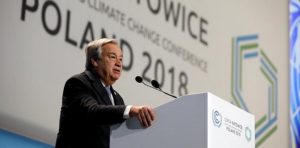Today’s Emissions Gap report shows that if nothing changes, in 2030, emissions will be 22 Gigatonnes higher than the 1.5 degree-limit will allow.

That’s roughly the total present annual emissions of the USA, China, and the EU combined.
It shows greenhouse emissions reaching all-time highs – a 1.2 per cent increase on last year – when those levels should be shooting down.
And those emissions are shattering temperature records. June, July, August, September and October were all the hottest on record.
Present trends are racing our planet down a dead-end three-degree temperature rise. In short, the report shows that the emissions gap is more like an emissions canyon. A canyon littered with broken promises, broken lives, and broken records.
All of this is a failure of leadership, a betrayal of the vulnerable, and a massive, missed opportunity.
Renewables have never been cheaper or more accessible.
We know it is still possible to make the 1.5 degree limit a reality. And we know how to get there – we have roadmaps from the International Energy Agency and the IPCC. It requires tearing out the poisoned root of the climate crisis: fossil fuels. And it demands a just, equitable renewables transition.
Leaders must drastically up their game, now, with record ambition, record action, and record emissions reductions.
The next round of national climate plans will be pivotal.
These plans must be backed with the finance, technology, support and partnerships to make them possible.
The task of leaders at COP28 is to make sure that happens.
This COP will respond to the Global Stocktake – an inventory of country’s climate plans which will show just how far the world is from meeting the goals of the Paris Agreement.
That response is vital. Voluntary initiatives and non-binding commitments can play an important role. But they are no substitute for a global response agreed by all.
The response to the Global Stocktake must light the fuse to an explosion of ambition in 2025. It must align with what the science tells us is needed.
It must set out plans to massively increase ambition and investment in adaptation. It must commit to a surge in finance and cooperation.
And it must set an expectation for more ambitious and detailed national climate plans.
That means national plans with clear 2030 and 2035 targets, that align with 1.5 degrees, that cover the whole economy, and that plot a course for ending fossil fuels.
These plans must provide clear market signals. We need market forces driving down emissions.
Governments need to put in place policies and regulations to give the private sector the certainty and predictability it desperately needs.
And the Global Stocktake response must be clear that credible action from the private sector is vital.
We need companies to produce comprehensive transition plans, in line with the recommendations of my High-Level Expert Group.
No more greenwashing. No more foot dragging.
Specifically, in their response to the Global Stocktake, countries must commit to triple renewables capacity, double energy efficiency and bring clean power to all, by 2030.
And they must also commit to phasing out fossil fuels, with a clear time frame aligned to the 1.5- degree limit.
Otherwise, we’re simply inflating the lifeboats while breaking the oars.
Achieving all this depends on countries cooperating and working together. The recent climate statement between China and the USA is a positive first step. But much more needs to be done.
And it depends on restoring trust between developed and developing countries, which has been badly damaged by broken promises and sluggish action.
Countries that have not yet done so should announce their contributions to the Green Climate Fund.
We need generous, early contributions to the new Loss and Damage Fund to get it off to a roaring start.
I welcome the European Union’s commitment to a substantial contribution, and look forward to hearing the details.
Developed countries must honour their promise of $100 billion a year in climate finance.
And they must deliver a clear plan on how they will meet their commitment to double adaptation finance to at least $40 billion a year by 2025.
At a time of doubt, division and distrust we need the response to the Global Stocktake to restore credibility in climate action.
Leaders can’t kick the can any further. We’re out of road. COP28 must set us up for dramatic climate action – now.
Finally, let me add that later today, I will travel to Chile and then to Antarctica to see for myself the deadly impact of the climate crisis.
Scorching temperatures mean Antarctic ice is melting ever-faster, with deadly consequences for people around the world.
I will take my experiences to COP where I will call for action that matches the scale of the crisis we face.
By António Guterres, Secretary-General of the United Nations
